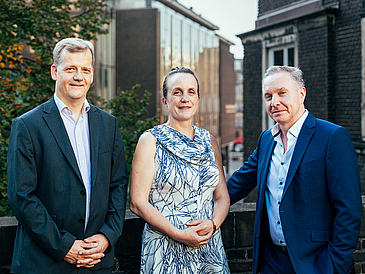“With the success of the Designing Interfaces project, the University of Bremen has established benchmarks to use in qualifying future teachers for the challenges of their profession. For example, the teaching plans were amended to encompass regular practical applications of theory. This enables the ongoing teachers to gain their own viewpoints. The Quality Initiative: Teacher Education has thus laid a solid foundation for the future training and further education of teachers. Now our goal is to implement the results of this project into consistent, everyday action. We are happy to participate in the further development process.” Kay Wenzel, head of department universities and research, Senator for Environment, Climate and Science, welcomed participants to the final event of the “Designing Interfaces” project with these words yesterday.
For the past eight years, a team of researchers from all of the university’s teacher education faculties, as well as the Institute of Public Health and Nursing Research (IPP) and the Institute Technology and Education (ITB), worked on the project to develop new approaches to improve teacher education – from undergraduate studies to further training in schools. The project received 5.4 million euros in sponsorship from the Federal Government and the Länder as part of the “Quality Initiative: Teacher Education”. “A defining quality of good teachers is that they are and remain interested in learning! That they reflect and combine subject studies, subject-specific didactics and pedagogy, theory, and practice. They cooperate and seek out appropriate advanced training. The ‘Designing Interfaces’ project significantly contributed to ensuring that students gain this stance and develop methods for implementing it,” said Lars Nelson, Head of the department “Formative Assessment in Public Schools and Teacher Education” of the Senator's Office for Children and Education.
The “Designing Interfaces” motto refers to the integration of different academic disciplines – between theory and practice, and between different parties in teacher education. “The guiding principle by which we designed all subprojects was that of the Reflective Practitioner,” explains Sabine Doff, professor of English Language Education and head of the project. “By this, the project team understands a teacher who can consistently reflect, plan, and rethink his or her actions against the backdrop of current events, learned theories, and methods.” The team has published the concept and results of the project on its own website as well as in a flagship publication. At uni-bremen.de/schnittstellen-gestalten, interested parties can find more information and download the mission statement. The website is currently available in German only.
A Wide Range of Services Even After the Project Ends
“Designing Interfaces” comprises five subprojects, the results of which were presented at the closing event. Numerous services and concepts will extend beyond the end of the project.
The BOOC – Blended Open Online Courses subproject developed a digital service which enables students to learn methods of empirical social research. It contains texts, interactive graphics, and video interviews (tutorials) with experts on the research process and empirical research methods. At https://booc.uni-bremen.de, the materials continue to be available to students at the University of Bremen as well as external students.
In the p:ier: Portfolio – individual – electronic – reflected subproject, the project team created a digital and interactive portfolio for students and trainee teachers, for example for lesson drafts, worksheets, or presentations. Students can share their own portfolios with teaching staff members or fellow students and receive feedback on them. At https://eportfolio.uni-bremen.de/, p:ier remains available for students at the University of Bremen and trainee teachers in the state of Bremen.
In the Study-Practice-Projects, students were able to put the knowledge they had acquired during their studies into practice. In cooperation with Bremen schoolteachers and under the supervision of university lecturers, they developed solutions for concrete challenges in Bremen schools, for example around the topics of digitalization and inclusion. The program will be supervised by staff beyond the end of the project.
Under the heading Digi-Spotlights, concepts were developed for university courses with the goal of better synergizing subject studies and subject-specific didactics and introducing them to students using digital media, among other things. To this end, for example, a mathematics subject course was given a separate strand specifically for student teachers with a focus on making the links to subject-specific didactics clear. The results of the Digi-Spotlights will still be available after the end of the project.
The SteBs subproject (Structural Development in Vocational Teacher Training) creates links between the different phases and subjects of vocational teacher training. Different concepts and services for degrees, postgraduate teaching internships, and advanced training have been developed. These include learning modules for dealing with diversity in vocational schools, advanced training for teachers, as well as concepts, tasks, and materials for teaching to specific groups. All SteBs results will continue to be available at http://unihb.eu/bbs (in German only).
Further Information:
uni-bremen.de/schnittstellen-gestalten (in German only)
https://www.qualitaetsoffensive-lehrerbildung.de/ (in German only)
Contact:
Prof. Dr. Sabine Doff
Principal investigator „Designing interfaces“
University of Bremen
Telefon +49 421 218-68170
Email: doff@uni-bremen.de

